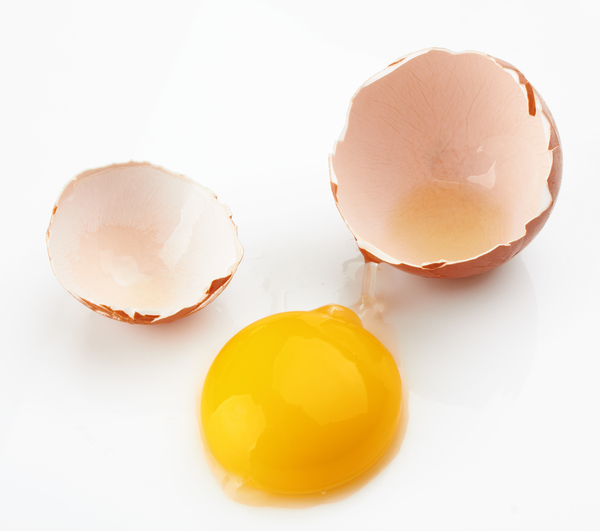Eggs and egg products

Eggs are a popular food for humans, but what about dogs? Can dogs eat eggs and if so, what are the pros and cons? In this article, you'll find out everything you need to know about eggs and egg products for dogs.
What are eggs and egg products?
Eggs are fertilized or unfertilized ova from birds or reptiles. Most people eat chicken eggs, but there are also other types of eggs, e.g. from ducks, geese, quails or ostriches. Eggs consist of the shell, the egg white (albumen) and the yolk (vitellus).
Egg products are products made from eggs or parts of eggs. These include, for example, egg powder, egg white powder, whole egg powder, egg yolk powder, liquid egg or dried egg. These products are often used as ingredients in other foods such as baked goods, pasta, sauces or ready meals.
What are the benefits of eggs and egg products for dogs?
Eggs and egg products can be a good addition to your dog's diet as they contain many valuable nutrients. These include, for example
- Protein: Eggs are a high-quality source of protein for dogs, containing all the essential amino acids. Protein is important for building and maintaining muscles, skin, hair, nails and organs.
- Fat: Eggs contain healthy fat, which is important for the function of the nervous system, hormones and cell membranes. Fat also provides energy and protects against the cold.
- Vitamins: Eggs are rich in vitamins, especially vitamins A, D, E and K. These vitamins are important for vision, the immune system, skin health and blood clotting.
- Minerals: Eggs contain many minerals such as calcium, phosphorus, iron, zinc and selenium. These minerals are important for the formation of bones, blood, enzymes and antioxidants.
What are the disadvantages of eggs and egg products for dogs?
Eggs and egg products are not suitable for all dogs. There are some possible disadvantages or risks that should be considered:
- Allergy: some dogs can have an allergic reaction to eggs and egg products. Symptoms may include itching, skin rash, diarrhea or vomiting. If you suspect that your dog is allergic, you should consult a vet.
- Salmonella: Raw or undercooked eggs can contain salmonella. Salmonella is a bacteria that can cause gastrointestinal infections. Symptoms can include diarrhea, vomiting, fever or loss of appetite. To minimize the risk, you should only use fresh and clean eggs and cook or fry them well.
- Cholesterol: Too many eggs can increase your dog's cholesterol level. Cholesterol is a fatty substance in the blood that can lead to cardiovascular disease. To minimize the risk, you should not give your dog more than one or two eggs per week.
- Biotin deficiency: Raw egg whites contain a protein called avidin, which inhibits the absorption of biotin.
Eggs are fertilized or unfertilized ova from birds or reptiles, with chicken eggs being the most commonly eaten. They consist of shell, egg white and yolk. Egg products are products made from eggs, such as egg powder or liquid egg, often used in foods such as baked goods.
Eggs and egg products are a valuable addition to a dog's diet due to their high content of protein, healthy fats, vitamins and minerals. Eggs promote muscle growth, skin health, the immune system and more.
However, eggs and egg products can also have disadvantages. Some dogs may have allergic reactions or get salmonella from raw eggs. In addition, high egg consumption can increase cholesterol levels and raw egg whites can lead to biotin deficiency. It is therefore important to limit the quantity and cook the eggs well.
If you notice any signs of hypersensitivity or poisoning in your dog, you should see your vet immediately. We are not a substitute for a vet, but we try to be as accurate as possible. Every dog reacts differently and we recommend you get a second opinion or consult your vet if in doubt.
Stay healthy and take good care of your four-legged friend!😊
Similar to Eggs and egg products
Eggs are an excellent source of high-quality protein, which is important for muscle building and cell regeneration. They also contain many vitamins (A, B, D, E, K), minerals (calcium, phosphorus,...
Egg yolks can have some health benefits for dogs when fed in moderation. For example, egg yolk can: Make the coat shinier and smoother as it is rich in biotin and lecithin. These substances support...
Whole egg is nothing more than the whole egg as you know it from the shell. However, whole egg is usually pasteurized, i.e. it is briefly heated to a high temperature to kill germs. This makes the...
Aquafaba is the cooking water from chickpeas and other pulses, which takes on a slightly thick consistency when boiled down. The name comes from Latin and means "bean water". Aquafaba was long...



